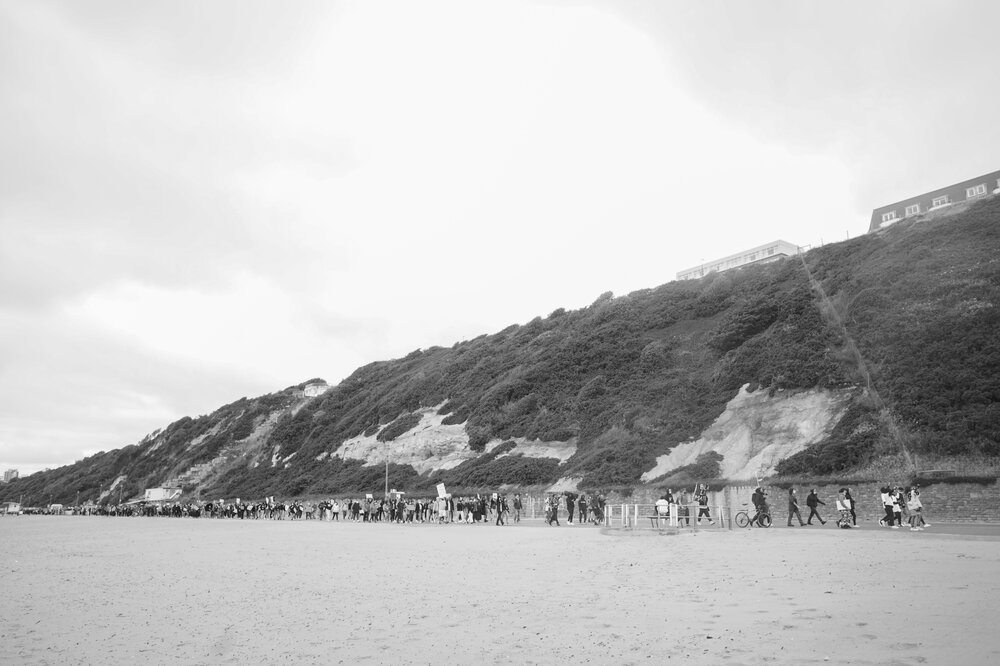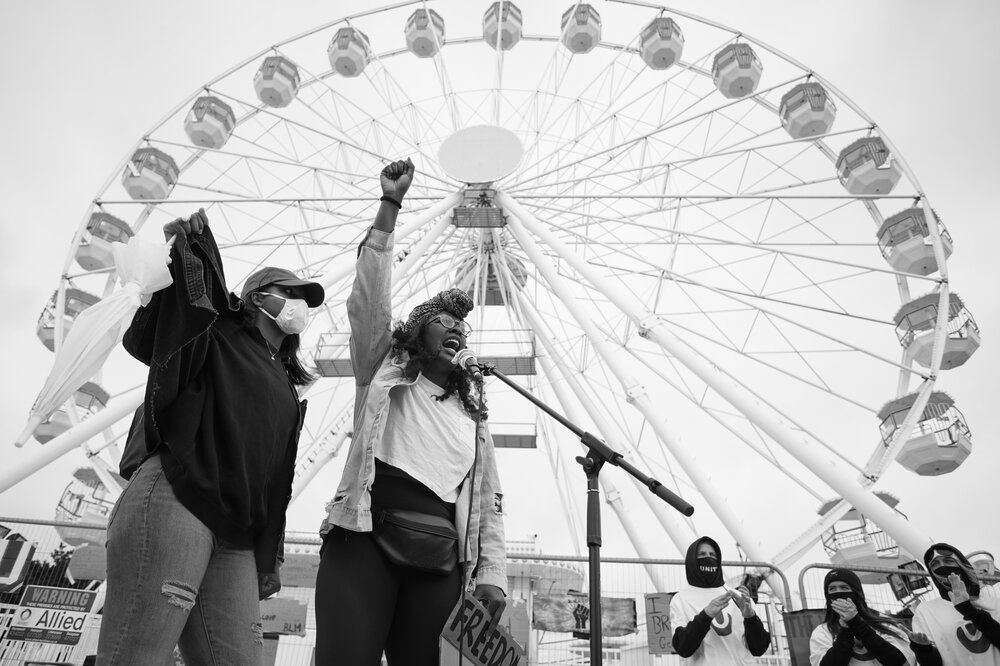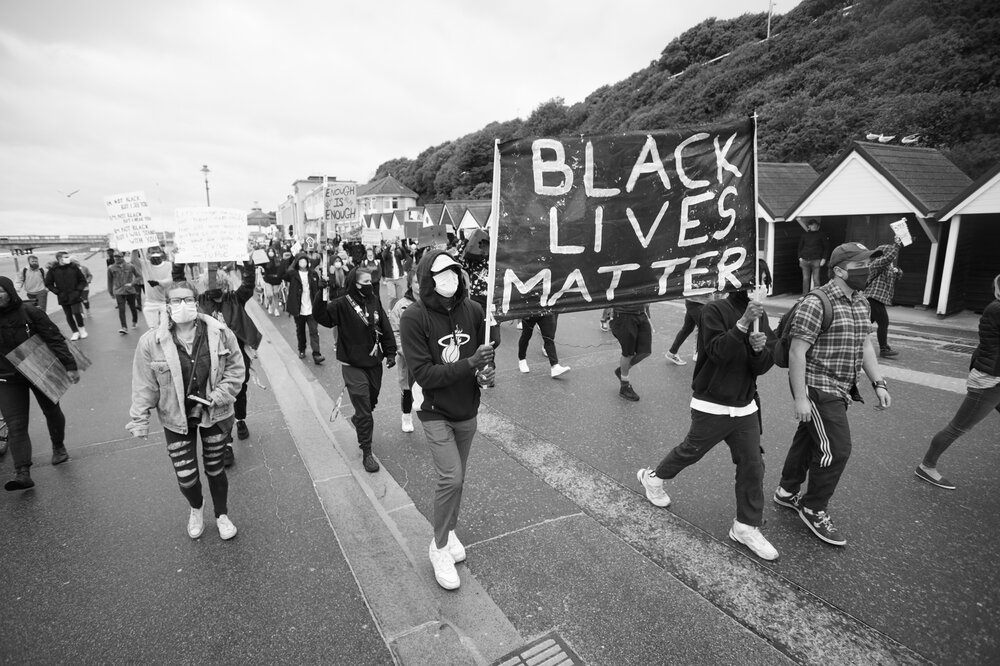Blimey, yesterday was interesting, and a strange feeling tumult of heartening and challenging. As is typical of right now. Our country’s polarisations seem to have turned into frantic wrestles with something, everything, each other, ourselves. Here’s my personal therapeutic thought note on what struck me.
ORIGINALLY POSTED TO FACEBOOK. PHOTOGRAPHY BY JAMES TURNER.
I generally echo Rachel’s combination of feelings in her re-post below, speaking as she does as a medical professional with some racial insights. And I went to bed last night wanting to know: How do those of us who are BAME and care workers in the pandemic feel about yesterday’s race protests?
So many of us in the UK have frankly led the government in trying to demonstrate community responsibility in a biological emergency this year, costing us who knows what emotional toll alone. It’s a seismic shock to our usual flow of life. This has been happening for three months.
For others of us in the same country, trying to demonstrate community responsibility has felt against the flow of the system I think, like a thousand little cuts and too many recurring deep wounds. This has taken its emotional toll on generations.
Both of these problems are rooted to the shape of how our country works fundamentally, and how it affects our well-being and our security. The interesting thing there is… how many different groups of us might relate to the second statement? Which shows just how systemic are our cultural problems. But the issue of race I’ve come to believe roots to the foundation of our very society. It’s not imported on ships from the Windies still just within living memory. It’s something our society is built on.
We’ve often said in our house that it feels like our generation – X – in some of our good fortune with the property bubble have had to finally address a lot of papered over, painted over, boarded over, bodged conversions and multiple redecorations in the houses we’ve incredibly luckily been able to afford. If we have. Finally bothering to strip off all those layers of wallpaper, strip back the spindles of the staircase, pull up the cheap laminate flooring, get back to the brickwork, replace the roof, re hang the tiles, discover the original features and cherish them. But ensure the foundations and fundamentals are sured up. Preventing lots of pieces of our heritage being lost, doing the grafting work needed to bring them back to life before they fall down.
Hate to break it to us, weary folk, especially since most of us will grind our teeth now at the privileged property metaphor, but this is us right now and Britain’s economic history. Because it’s a racial economic history that we’ve not finished dealing with. We seem barely able to face it even now. But, in a crisis era, of multiple security threats to us all at once, mostly built on our habitual behaviours, we’re simply going to have to get into the work.
Over the last couple of weeks, the government has been leaking out all kinds of bits of freedoms for us, and this transition back period was always going to be a ruddy awkward, make-it-up-as-we-go-along, frustrating time. Even if the government had been strategically clear and purposeful and careful from the beginning. Which it hasn’t been. So many of us feel equally we wish we could get on with normal life again, but that the lockdown may have been leaking early. My local beaches heaving with care-free bathers ten days ago is testimony to how ready we are to forget responsibilities, but perhaps it’s all over, for government at the very top seems to behave as if it is.
It’s in this moment, not early lockdown, that race protests happened this weekend.
But it’s not like we always get to pick our moment. George Floyd is one more name in a shockingly long list of people of colour who didn’t. And this might not resonate with you, honestly. Or it might be just one more deep cut too many for you.
The pandemic is far from over. The charts in this country are not good. And we’re none of us quite sure what the right thing to do is in different moments. Some of us have been long saying: “For goodness sake, do you need telling EVERYTHING?” Intuition and responsibility drive our micro decisions every day around the clearest shared guidance we can find.
Now, if we can pause our own frustrations and wearinesses for a moment, staring into the stream of edited stories and pictures of yesterday, I’d ask we ponder this:
Why would people who are, incredibly, much more likely to suffer from Covid19 – us, if we’re BAME – choose THIS moment to come out and gather in the streets? Do we not understand the risks or responsibilities?
What is the trauma among us forcing people to do this?
After feeling we could and should carefully represent in Bournemouth yesterday, every single person there masked, gloved, keeping apart, respecting the police service who gave the go ahead and kept calm presence, I have to say it felt an important single moment to represent this crisis in our midst also. Far more people turned up, or drove past honking and cheering than the organisers expected. We shall be isolating for a few days to be sure, and have no plans to join a public meet up on this scale again.
This is complex. Our times are. Our feelings are. And shamefully, after generations, this feels only like the very start. It certainly, shamefully, is in me. But I’m not interested in shame. This is all about creating a more sustainable human future. Which means facing what we’re really dealing with in ourselves.
It. Is. Always. Worth. It. Because by suring up our foundations of justice, we join the road to peace.
I’m convinced the first bit of work is some deep listening. That’s the courage we’re really being called to. It might start by becoming very aware of who we we want to blame for our own pains. And why.
—
Rachel Ali wrote: “Of course the protests worry me, I’m anxious about a second wave.
But speaking out about the systemic entrenched racism in this country and in all Western countries is bloody important. I support the protests. I wish they weren’t necessary. I really wish they weren’t necessary now. But I support them.
PS: If you’ve looked at the higher rates of death in BAME communities and blamed genetics or race, then you need to do some more reading.”


